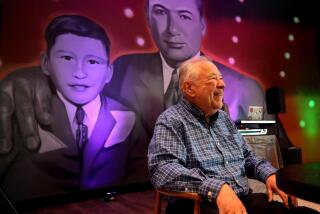Cyber Skills for Those Who Speak Spanish
- Share via
Before heading to his job as a machine operator, Danilo Perez perches in front of a computer screen glowing with an Excel spreadsheet.
Perez, 44, is learning computer basics at the nonprofit Academia Computer Learning Center, which was opened in an office building in October by two high-tech specialists who want to close the gap between computer haves and have-nots among Spanish speakers.
“The goal is not to make the students into Bill Gates,” said Kirk Kinder, a 41-year-old Fullerton resident and former tech job recruiter who co-founded the center. “It’s so the people know the computer is not a monster to be afraid of.”
Ten hours of instruction in Spanish, spread over five days, get students started with the Internet, word processing programs and Excel.
The day and evening classes, taught by co-founder Adolfo Rivera, are free and have attracted more than 100 students. The founders cover the cost, hoping to be funded by computer companies eager to expand their markets by attracting consumers like Perez, who do not have computers now.
“I want to buy a computer and I really don’t know how to use one,” said Perez, who works at a Santa Ana factory. “I think if I can use it I might be able to get a better job.”
Kinder said Perez and others like him were “clearly the next generation of computer purchasers, and companies may be eager to court them” through computer instruction programs like his.
Other students may already have bought computers but now aren’t sure what to do with them. That’s the case with Mireya Reynoso, 38, a stay-at-home mother who bought a computer three months ago but still hasn’t taken it out of the box.
“I even took classes at a college, but I didn’t understand enough,” Reynoso said. “I feel more confident because these classes are in Spanish.”
Rivera, 43, a native of Chile and owner of an information technology consulting business in Garden Grove, conceived of the center after completing his master’s thesis on computer use among Latinos.
Rivera said a professor told him the subject was “ ‘a waste of time. Spanish people don’t use computers. They wait tables. They cut lawns. They take care of children.’ I’m Hispanic and I knew that was not true.” And he notes the increasing number of jobs that require computer skills.
Rivera met Kinder while job hunting. They discovered that they each wanted to help Latinos land better jobs by teaching them basic computer skills.
A program with more advanced computer training is offered in Santa Ana by the Sisters of St. Joseph of Orange.
Rivera and Kinder used about $50,000 of their own money to rent an office in a nondescript building at 17th and Bristol streets in Santa Ana and equip it with nine computers.
During a recent class, Rivera spoke to four students about the importance of the Internet.
“What use does the Internet have?” he asked them in Spanish.
“We can get information,” said one.
“We can buy things on the Internet,” another answered.
“We can send messages, e-mail,” said yet another.
Rivera hopes the courses will whet the students’ appetite for more instruction elsewhere.
Kinder said the two had already been approached by the city of Santa Ana and computer companies that wanted to provide them funding.
Judy Chen-Lee, director of the Santa Ana Work Center, a city-operated job training and placement service, said she didn’t know of other privately funded, free computer skills classes.
She is impressed enough by the partners’ work that she is considering referring people to their center, which would increase its visibility and opportunities to gain private funding. And she said her center may provide funding in future years.
“We want to collaborate with them because it helps our community,” she said.
Buoyed by the offers of support, Rivera and Kinder said they hoped to open computer learning centers elsewhere in the state.
“We get a lot of comments like ‘I’ve seen computers at work, but I’ve never used one,’ ” Kinder said. “We know that we can make an impact.”






